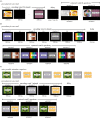Ventrolateral and dorsomedial frontal cortex lesions impair mnemonic context retrieval
- PMID: 25567650
- PMCID: PMC4309002
- DOI: 10.1098/rspb.2014.2555
Ventrolateral and dorsomedial frontal cortex lesions impair mnemonic context retrieval
Abstract
The prefrontal cortex appears to contribute to the mnemonic retrieval of the context within which stimuli are experienced, but only under certain conditions that remain to be clarified. Patients with lesions to the frontal cortex, the temporal lobe and neurologically intact individuals were tested for context memory retrieval when verbal stimuli (words) had been experienced across multiple (unstable context condition) or unique (stable context condition) contexts; basic recognition memory of these words-in-contexts was also tested. Patients with lesions to the right ventrolateral prefrontal cortex (VLPFC) were impaired on context retrieval only when the words had been seen in multiple contexts, demonstrating that this prefrontal region is critical for active retrieval processing necessary to disambiguate memory items embedded across multiple contexts. Patients with lesions to the left dorsomedial prefrontal region were impaired on both context retrieval conditions, regardless of the stability of the stimulus-to-context associations. Conversely, prefrontal lesions sparing the ventrolateral and dorsomedial regions did not impair context retrieval. Only patients with temporal lobe excisions were impaired on basic recognition memory. The results demonstrate a basic contribution of the left dorsomedial frontal region to mnemonic context retrieval, with the VLPFC engaged, selectively, when contextual relations are unstable and require disambiguation.
Keywords: context retrieval; dorsomedial frontal cortex; hippocampus; memory retrieval; prefrontal cortex; ventrolateral prefrontal cortex.
© 2015 The Author(s) Published by the Royal Society. All rights reserved.
Figures



Similar articles
-
Left mid-ventrolateral prefrontal cortex: underlying principles of function.Eur J Neurosci. 2008 Feb;27(4):1037-49. doi: 10.1111/j.1460-9568.2008.06066.x. Epub 2008 Feb 13. Eur J Neurosci. 2008. PMID: 18279361
-
The mid-ventrolateral prefrontal cortex and active mnemonic retrieval.Neurobiol Learn Mem. 2002 Nov;78(3):528-38. doi: 10.1006/nlme.2002.4107. Neurobiol Learn Mem. 2002. PMID: 12559832
-
Autobiographical memory of the recent past following frontal cortex or temporal lobe excisions.Eur J Neurosci. 2008 Aug;28(4):829-40. doi: 10.1111/j.1460-9568.2008.06381.x. Eur J Neurosci. 2008. PMID: 18702694
-
Specialized systems for the processing of mnemonic information within the primate frontal cortex.Philos Trans R Soc Lond B Biol Sci. 1996 Oct 29;351(1346):1455-61; discussion 1461-2. doi: 10.1098/rstb.1996.0130. Philos Trans R Soc Lond B Biol Sci. 1996. PMID: 8941957 Review.
-
Left ventrolateral prefrontal cortex and the cognitive control of memory.Neuropsychologia. 2007 Oct 1;45(13):2883-901. doi: 10.1016/j.neuropsychologia.2007.06.015. Epub 2007 Jun 29. Neuropsychologia. 2007. PMID: 17675110 Review.
Cited by
-
Predictability matters: role of the hippocampus and prefrontal cortex in disambiguation of overlapping sequences.Learn Mem. 2018 Jul 16;25(8):335-346. doi: 10.1101/lm.047175.117. Print 2018 Aug. Learn Mem. 2018. PMID: 30012878 Free PMC article.
-
Unraveling the Thread of Aphasia Rehabilitation: A Translational Cognitive Perspective.Biomedicines. 2023 Oct 21;11(10):2856. doi: 10.3390/biomedicines11102856. Biomedicines. 2023. PMID: 37893229 Free PMC article. Review.
-
Stability or Plasticity? - A Hierarchical Allostatic Regulation Model of Medial Prefrontal Cortex Function for Social Valuation.Front Neurosci. 2020 Mar 31;14:281. doi: 10.3389/fnins.2020.00281. eCollection 2020. Front Neurosci. 2020. PMID: 32296303 Free PMC article.
-
Gray Matter Density of the Dorsomedial Prefrontal Cortex Mediates the Relationship Between Catastrophizing and Anxiety in Somatic Symptom Disorder.Neuropsychiatr Dis Treat. 2021 Mar 9;17:757-764. doi: 10.2147/NDT.S296462. eCollection 2021. Neuropsychiatr Dis Treat. 2021. PMID: 33727819 Free PMC article.
-
Neurocognitive Profiles of Caucasian Moyamoya Disease Patients in Greece: A Case Series.NeuroSci. 2022 Feb 23;3(1):119-129. doi: 10.3390/neurosci3010010. eCollection 2022 Mar. NeuroSci. 2022. PMID: 39484672 Free PMC article.
References
Publication types
MeSH terms
Grants and funding
LinkOut - more resources
Full Text Sources
Other Literature Sources
Medical

